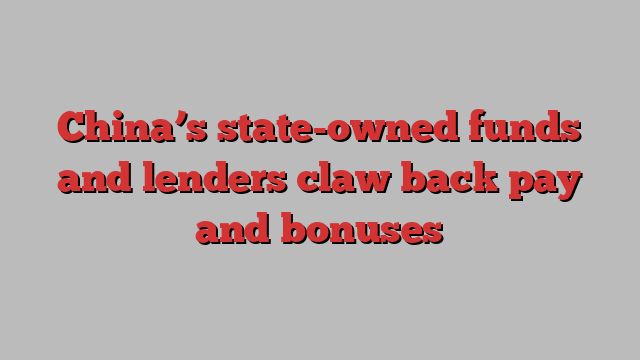
Unlock the Editor’s Digest for free
Roula Khalaf, Editor of the FT, selects her favourite stories in this weekly newsletter.
Chinese state-owned financial institutions are clawing back bonuses and cutting pay as Beijing broadens its scrutiny of the finance industry to include mutual funds and Hong Kong-based bankers.
Some leading state-owned mutual fund managers on the mainland have been told to return the portion of their annual salary that exceeded a cap of Rmb2.9mn ($400,000), according to two fund managers who received guidelines in the wake of an onsite audit in June. The payment of this year’s bonuses had been delayed, one said.
Hong Kong-based executives at units affiliated to state-owned Citic Group on mainland contracts have been told to return bonuses, two people briefed on the situation said. Executives at the investment unit of Hong Kong’s state-owned conglomerate Everbright Group have also been told to return bonuses received in recent years, two people familiar with the decision said.
This pressure follows tighter controls of state-owned financial conglomerates on the mainland, bankers briefed on the measures told the Financial Times, with that scrutiny now being extended to funds as well as bankers who work for state institutions in Hong Kong, in particular those on mainland contracts. The Chinese finance ministry generally signs off on overall pay packages for state lenders.
China’s President Xi Jinping has repeatedly emphasised the importance of “new quality productive forces” such as technology and manufacturing over finance, as part of a nationwide campaign for “high quality development”.
He has also espoused “common prosperity”, a philosophy that has coincided with a crackdown on bankers and their excesses. “We clearly still see the ‘common prosperity’ theme playing out as well as Xi’s view that much of finance is parasitic of ‘real’ economic activities,” said Victor Shih, director of the 21st Century China Center at the University of California, San Diego.
The latest moves “show that Hong Kong, because of its close economic connections, will not be immune to mainland China’s financial and regulatory reform”, said Gary Ng, a senior economist at Natixis. “Still, the impact will depend on whether the trend will amplify further on both wages and headcounts.”
For mainland financial executives dispatched to Hong Kong for work “this is not a surprise any more,” said one executive at Citic, who did not want to be named. “You can’t escape from it if your contracts and pay package are still under the management of headquarters in Beijing.”
The fund industry “has become another scapegoat,” a Beijing-based manager of one top-sized mutual fund house added. “IPO bankers had taken the hit, now it’s the turn of the fund managers.”
“All the securities and mutual fund units of state-owned financial conglomerates are expected to feel the impact,” said a banker at a Beijing state-owned securities firm. “Executives and high-pay staff were the main targets initially, but now the scope of the inspections has widened. Our travel expenses for the past five years are now being reviewed for whether they have exceeded the certain standards.”
In Beijing, many state lenders are considering further pay cuts, with some executives at China Construction Bank facing another 10 per cent cut in pay this year, according to bankers briefed on the discussion. Pay cuts hinge on individual performance.
In a document published after the Chinese Communist party’s third plenum, China’s leadership vowed to continue financial system reforms and guard against systemic financial risks.
In April, China’s top anti-graft body launched a new round of inspections targeting 34 major economic and financial regulators, as well as the big four state-owned banks and several leading state insurers. In June, the National Audit Office began conducting rare onsite audit reviews of the top 10 mutual fund houses, two people in fund houses said.
Hong Kong-based staff at state lender Industrial and Commercial Bank of China complained about the bank’s cancellation of one-off bonuses to mark the anniversary of the handover of the territory to China. “We are badly paid already . . . Now we’re waiting for a pay freeze as the next step,” according to one member of staff at ICBC Asia.
Everbright Group, its Hong Kong investment arm Everbright Holdings, Citic Group, the National Audit Office, CCB, and ICBC did not immediately respond to requests for comment.